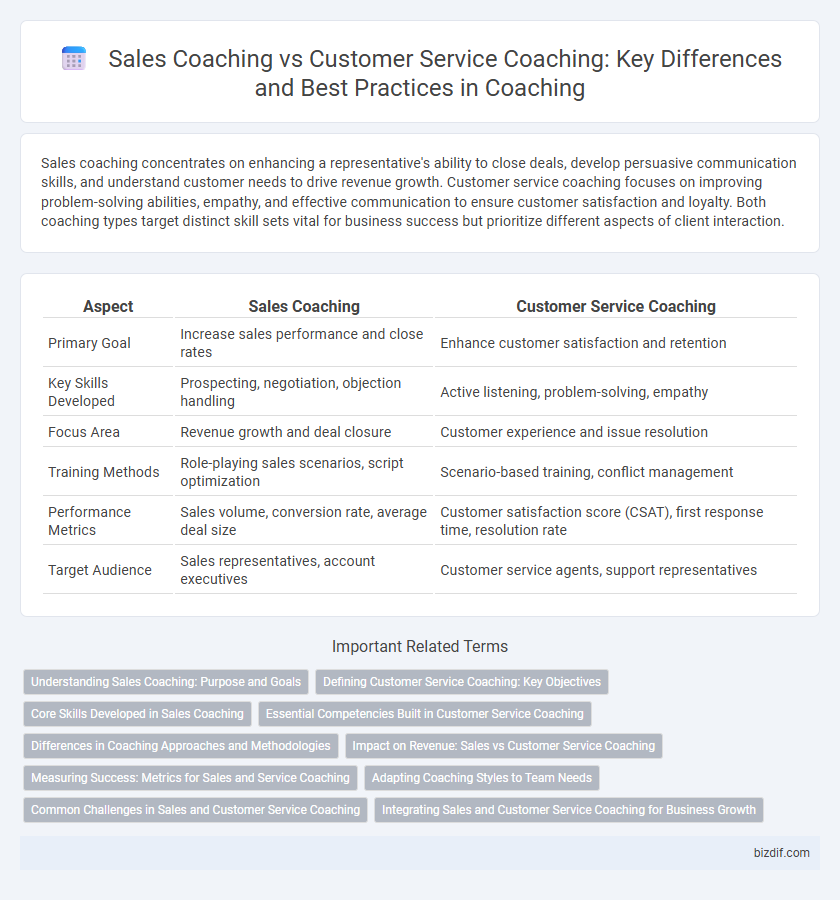Sales coaching concentrates on enhancing a representative's ability to close deals, develop persuasive communication skills, and understand customer needs to drive revenue growth. Customer service coaching focuses on improving problem-solving abilities, empathy, and effective communication to ensure customer satisfaction and loyalty. Both coaching types target distinct skill sets vital for business success but prioritize different aspects of client interaction.
Table of Comparison
| Aspect | Sales Coaching | Customer Service Coaching |
|---|---|---|
| Primary Goal | Increase sales performance and close rates | Enhance customer satisfaction and retention |
| Key Skills Developed | Prospecting, negotiation, objection handling | Active listening, problem-solving, empathy |
| Focus Area | Revenue growth and deal closure | Customer experience and issue resolution |
| Training Methods | Role-playing sales scenarios, script optimization | Scenario-based training, conflict management |
| Performance Metrics | Sales volume, conversion rate, average deal size | Customer satisfaction score (CSAT), first response time, resolution rate |
| Target Audience | Sales representatives, account executives | Customer service agents, support representatives |
Understanding Sales Coaching: Purpose and Goals
Sales coaching aims to enhance the skills and techniques of sales professionals to increase conversion rates and revenue growth. It focuses on developing product knowledge, communication strategies, and objection-handling tactics to drive sales performance. Understanding sales coaching involves aligning coaching sessions with measurable sales targets and customer acquisition goals.
Defining Customer Service Coaching: Key Objectives
Customer service coaching centers on enhancing employees' skills to deliver exceptional support, resolve issues efficiently, and foster positive customer interactions that boost satisfaction and loyalty. Key objectives include improving communication techniques, developing empathy, and empowering staff to handle diverse customer scenarios with professionalism. Unlike sales coaching, which targets closing deals and increasing revenue, customer service coaching prioritizes maintaining long-term customer relationships and brand reputation.
Core Skills Developed in Sales Coaching
Sales coaching develops core skills such as persuasive communication, prospecting, objection handling, and closing techniques that directly impact revenue growth. It emphasizes goal-setting, pipeline management, and negotiation strategies tailored to converting leads into customers. These competencies differ from customer service coaching, which prioritizes empathy, problem-solving, and conflict resolution for enhancing customer satisfaction and retention.
Essential Competencies Built in Customer Service Coaching
Customer service coaching develops essential competencies such as empathy, active listening, problem-solving, and conflict resolution, which directly enhance customer satisfaction and loyalty. These skills enable representatives to handle inquiries efficiently, address complaints effectively, and build positive customer relationships. In contrast, sales coaching prioritizes persuasion, negotiation, and closing techniques, making customer service coaching critical for service excellence and long-term retention.
Differences in Coaching Approaches and Methodologies
Sales coaching concentrates on enhancing persuasion techniques, closing strategies, and pipeline management using goal-oriented and results-driven methods. Customer service coaching emphasizes empathy, conflict resolution, and communication skills through scenario-based training and feedback loops. These distinct approaches address the unique performance metrics and customer interaction styles crucial to each domain.
Impact on Revenue: Sales vs Customer Service Coaching
Sales coaching directly influences revenue by enhancing sales techniques, improving conversion rates, and accelerating deal closures, which leads to immediate revenue growth. Customer service coaching boosts revenue indirectly by increasing customer satisfaction, fostering loyalty, and encouraging repeat business and referrals. Both approaches are essential, but sales coaching typically results in more immediate and measurable revenue impacts, while customer service coaching supports sustained long-term revenue through customer retention.
Measuring Success: Metrics for Sales and Service Coaching
Measuring success in sales coaching centers on metrics such as conversion rates, average deal size, sales cycle length, and quota attainment to evaluate performance improvements. Customer service coaching relies on metrics like customer satisfaction scores (CSAT), Net Promoter Score (NPS), first response time, and resolution rate to gauge service effectiveness and customer experience. Leveraging these distinct metrics enables tailored coaching strategies that drive measurable growth in sales outcomes and customer loyalty.
Adapting Coaching Styles to Team Needs
Sales coaching emphasizes goal-driven techniques to enhance persuasion, negotiation, and closing skills, while customer service coaching prioritizes empathy, active listening, and problem-solving to improve client satisfaction. Adapting coaching styles involves assessing team strengths, learning preferences, and performance gaps to tailor actionable feedback and targeted skill development. Customized coaching strategies foster improved motivation, productivity, and alignment with organizational objectives across diverse team dynamics.
Common Challenges in Sales and Customer Service Coaching
Sales coaching frequently faces challenges such as overcoming resistance to change, aligning coaching strategies with sales targets, and maintaining motivation in high-pressure environments. Customer service coaching often struggles with inconsistency in service quality, managing emotional labor, and adapting to diverse customer needs across channels. Both domains require tailored approaches to address skill gaps, ensure ongoing feedback, and promote behavioral change effectively.
Integrating Sales and Customer Service Coaching for Business Growth
Integrating sales and customer service coaching enhances business growth by aligning team objectives to improve customer interactions and increase conversion rates. Training programs that combine sales strategies with customer service skills foster seamless communication, boost customer satisfaction, and drive revenue. Businesses that implement integrated coaching see higher retention rates and a stronger competitive advantage in their markets.
Sales coaching vs customer service coaching Infographic

 bizdif.com
bizdif.com